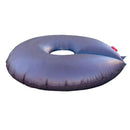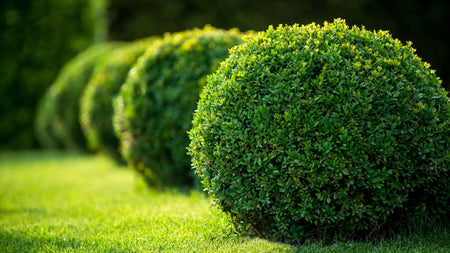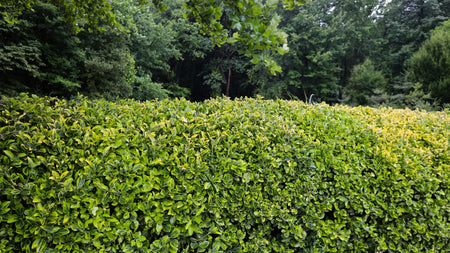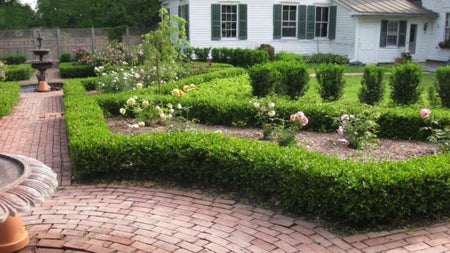
Images Depict Mature Plants
Wintergreen Boxwood – Hardy Evergreen for Classic Hedges and Borders
Timeless beauty for every landscape.
The Wintergreen Boxwood (Buxus microphylla ‘Wintergreen’) is a versatile evergreen shrub prized for its dense, small-leaf foliage and deep green color that remains vibrant throughout every season, even the coldest winter. Its classic, tidy appearance makes it a staple for formal hedges, foundation plantings, and elegant borders. Whether you’re designing a traditional knot garden or looking for an understated accent along walkways, Wintergreen Boxwood adds year-round sophistication.
A Low-maintenance and cold-hardy Boxwood.
Hardy in USDA Zones 4–9, Wintergreen Boxwood is an excellent choice for a wide range of climates. Once established, it tolerates both full sun and partial shade and is remarkably adaptable to different soil types, provided they are well-drained. Unlike some other boxwoods, this variety retains its vibrant dark green foliage even through harsh winters, eliminating the bronzing that can occur in cold weather.
Perfect for hedges and topiary.
Its naturally dense growth habit and slow, steady growth rate make it ideal for shearing into low hedges, rounded mounds, or formal geometric shapes. Plant multiple shrubs 2–3 feet apart to create a lush, evergreen privacy screen, or use single plants in containers and entryway planters for an elegant statement. Wintergreen Boxwood responds beautifully to regular light pruning, allowing you to maintain crisp edges and refined shapes with minimal effort.
Durable and Deer-resistant.
This boxwood is valued not only for its looks but also for its toughness. Once established, it is drought tolerant and resists browsing by deer—making it a reliable evergreen for suburban gardens and rural landscapes alike. Whether you’re creating a formal garden, a modern landscape, or simply adding structure to a mixed border, Wintergreen Boxwood delivers classic style with easy care.
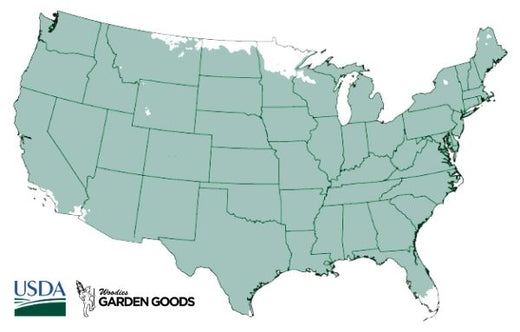
| Hardiness Zone: | 4-9 |
|---|---|
| Mature Height: | 2 to 4 Feet; less if trimmed |
| Mature Width: | 3 to 4 Feet; less if trimmed |
| Classification: | Evergreen shrub |
| Sunlight: | Partial to full sun |
| Habit: | Evergreen, dense foliage |
| Flower Color: | Inconspicuous |
| Foliage: | New growth emerges bright green changing to dark green |
| Soil Condition: | Any well drained soil |
| Water Requirements: | Water well until established |
How to Care for Wintergreen Boxwood
Be sure to read our planting instructions to ensure a healthy and happy Wintergreen Boxwood for years to come!
How do I plant Wintergreen Boxwood?
Begin by selecting a spot that receives full sun to partial shade and has well-drained soil, since boxwoods dislike standing water. Dig a hole twice as wide as the root ball but no deeper, loosening the soil to encourage quick root penetration. Position the plant so the top of the root ball sits level with the surrounding soil, then backfill with the amended soil and water thoroughly to settle it. Finish by applying a 2–3 inch layer of mulch around the base, taking care to keep mulch a few inches away from the trunk to prevent rot. Mulch helps regulate soil temperature and conserve moisture while reducing weeds. For best results, plant in early spring or early fall when temperatures are moderate and root growth is active.
How often should I water after planting?
During the first growing season, deeply water once or twice a week to help the roots establish. Adjust frequency based on weather—more often in hot, dry spells and less when rainfall is steady. Deep watering encourages strong root growth, which leads to better long-term drought tolerance. After the first year, supplemental watering is needed only during extended dry periods. Established Wintergreen Boxwoods can handle moderate drought, but a slow soak during prolonged dry weather will keep the foliage vibrant and healthy.
When and how should I fertilize Wintergreen Boxwood?
Feed in early spring with a balanced, slow-release fertilizer formulated for broadleaf evergreens. Apply the fertilizer evenly around the drip line—not directly against the trunk—and water thoroughly so nutrients penetrate the soil. This promotes lush growth and maintains the rich, deep green color. If your soil is poor or sandy, consider a light second feeding in midsummer, but avoid late-season fertilizing. New growth stimulated too late may not harden off before winter and can be damaged by frost. Regular soil testing every few years helps fine-tune your fertilizer schedule.

How do I prune Wintergreen Boxwood?
Lightly prune in late spring or early summer to maintain the desired shape, whether that’s a tight hedge or a rounded specimen. Remove stray or crossing branches first, then shear gently for uniformity. Always use clean, sharp shears to avoid tearing foliage and introducing disease. Avoid heavy pruning in late summer or fall because tender new shoots need time to harden off before winter. If you wish to rejuvenate an older plant, spread the work over two or three seasons, thinning interior branches a bit each year to allow light and air into the center.










